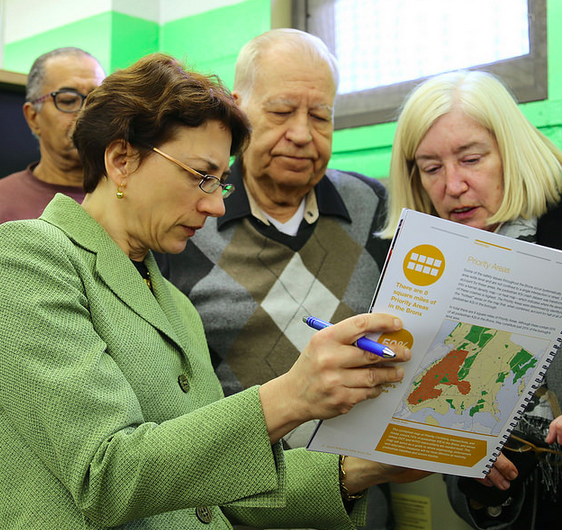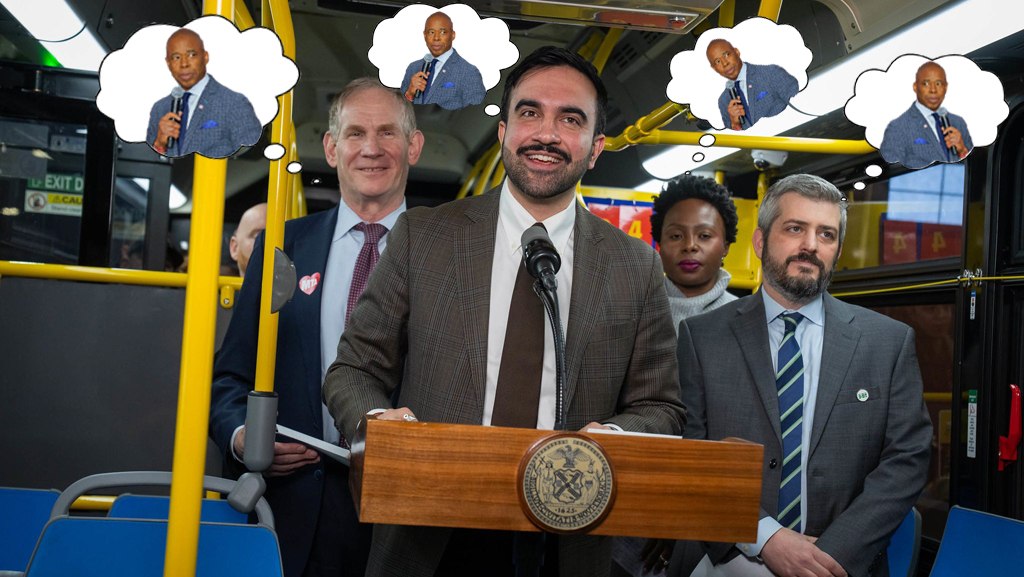New York City's 59 community boards often serve as the sole venues where the public can assess and vet street design projects. But they are also structured in a way that inhibits any sort of change, giving de facto veto power over street improvements to a small clique who can serve for life.

A bill in the City Council would establish term limits for community board members, but the reform would only go so far. Under the bill, current community board members would be grandfathered in, meaning they would face no term limits while new appointees would. Meanwhile, DOT Commissioner Polly Trottenberg shows no inclination to change the agency's policy of giving community boards the final say on its street safety projects.
The term limits bill, sponsored by Council Member Daniel Dromm, would limit new community board appointees to six two-year terms. After reaching the maximum term, people could still attend and speak at community board meetings but could no longer hold a voting seat.
Despite allowing all current board members to escape term limits, the bill is opposed by all five borough presidents, whom appoint people to community boards. A spokesperson for Eric Adams said the Brooklyn borough president is "supportive of term limits in concept" but opposes this bill. Queens Beep Melinda Katz supported term limits as a candidate [PDF] but now opposes them.
Staff of Manhattan Borough President Gale Brewer [PDF] joined district managers and board members from Brooklyn, Manhattan, Queens, and the Bronx testifying against the bill yesterday before the City Council governmental operations committee, saying term limits would decimate institutional knowledge on the boards.
A united front of good government advocates at the hearing, including Citizens Union, New York Public Interest Research Group, Common Cause New York, and Transportation Alternatives [PDF], supported term limits and argued for further reforms to bring more daylight to the appointment process.
"When it comes to Vision Zero and traffic safety, we often see a large divide between members who have been serving for their entire lives and came of age when the car was king in New York City, and members of all ages who think more in tune with the modern state of urban planning and street design," said TA's Paul Steely White. "People are prioritizing a single parking space over daylighting an intersection, for example."
Council Member Jimmy Vacca, a former district manager of Bronx Community Board 10, was not convinced. "Are some boards having NIMBY on bicycles, as Mr. White mentioned? Of course," he said. "That’s not to say that people should be removed, get the hell out."
Dromm said boards need turnover to ensure a broad spectrum of the community has a voice. "I too have seen a lot of obstructionism going on. And I’ve been to many community boards," he said. "I hear ‘I remember when,’ and ‘when’ was 40 years ago."
DOT is required to notify community boards of street design changes, but community board votes are advisory, without binding power. Nevertheless, the agency typically lets them halt or dramatically alter projects.
At an event hosted by the General Contractors Association of New York yesterday, Transportation Commissioner Polly Trottenberg, who declined to express an opinion on term limits, said the appointed boards are "a nice bit of urban democracy" that "actually works very well."
"It’s a great forum to bring projects, to hear community concerns, to find people who care deeply about their neighborhoods, to get local input. We don’t agree 100 percent of the time," she said. "By the time we’ve really spent some time walking through what we want to do, we’ve won people over, and changed our plans as we've gotten their input."
"Particularly as we’ve done our Vision Zero projects," Trottenberg said, "one thing that’s been really gratifying is almost every part of the city we’ve gone to... we’ve gotten a lot of support and very caring and well-educated people on the community boards that want to partner with us on these projects.”
Street safety advocates say reality isn't quite so rose-tinted.
"We attend community board meetings virtually every night throughout the city,” White told the City Council. "We've seen too many life-saving traffic safety improvements die at community boards for the wrong reasons."
That caught the attention of Council Member Ritchie Torres, who opposes community board term limits. "I think the real issue is not whether there should be term limits, but why do we allow community boards to be stumbling blocks to safe streets?" he asked. "We don’t require community board approval when we’re making decisions about fire safety or policing policy."
“It’s a matter of reminding DOT that your first obligation is not to appease the community board," Torres said. "It is to do what has been empirically shown to prevent traffic violence on our streets.”
5:24 p.m.: This post has been updated with more information on the positions of the borough presidents.





